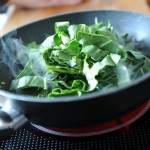 Q: My six-year-old daughter has just been diagnosed with a dairy intolerance, but I’m concerned about the impact cutting dairy from her diet will have – how can I make sure she gets enough calcium?
Q: My six-year-old daughter has just been diagnosed with a dairy intolerance, but I’m concerned about the impact cutting dairy from her diet will have – how can I make sure she gets enough calcium?
I understand your concern. Since the 1950s the Milk Marketing Board has been telling us that the best source of calcium is through dairy and that calcium is the most important mineral for healthy bones.
However, green leafy vegetables have approximately as much or more calcium than milk by the cup. And greens, unlike milk, have the added benefit of vitamin K, magnesium and many more important minerals that are necessary for strong bones.
Large studies which looked at the relationship between milk consumption and the risk of hip fracture (you don’t get hip fractures if you have dense bones) [1] showed that higher milk consumption did not reduce the risk of hip fracture. Interestingly, bone records before 10,000 years ago shows good bone health. We therefore managed 2 million years without dairy in our diets and still had strong bones. A recent British Medical Journal confirmed that there was little evidence that calcium supplementation and milk drinking helps build strong bones and did not reliably increase bone mineral density or reduce fracture rate in children or adolescents [2].
What you need to eat for healthy bones
- Fresh, dark green vegetables such as spinach, kale, chard, broccoli
- Dry beans
- Sesame seeds and almonds
- Wild salmon and sardines (tinned are OK)
- Rhubarb
- Healthy fats (omega 3 and 6 fats from salmon, sardines, mackerel, tuna, avocado, coconut oil, nuts and seeds)
- Vitamin D from sunshine
- Exercise which strengthens bone mass through weight bearing exercise
In summary, we need much more than just calcium and dairy to build strong bones.
[1] Bischoff-Ferrari HA, et al. Milk intake and risk of hip fracture in men and women: a Meta-analysis of prospective cohort studies. J Bone Miner Res 2010 Oct 14 [Epub ahead of print] [2] Lanou AJ, et al. Calcium, dairy products and bone health in children and young adults: a re-evaluation of the evidence. Paediatrics 2005;115: 736-43
OUR EXPERT:
Maria is a registered nutritionist with the British Association of Nutritional Therapists. She has a BSC degree in Nutritional Medicine and practices from Nourish, her clinic in Bath. As well as attending to clients, she writes and speaks on all matters relating to nutrition and lifestyle. She is dedicated to providing individuals with information and advice to take control of their own health and well-being. www.nourishcentre.co.uk.
Do you need help with your free-from cooking, or do you have a nutritional query? Email your question to nick.gregory@anthem-publishing.com to ask the experts for advice.
Have a look at this article for more information on bone health and a dairy-free or vegan diet.

